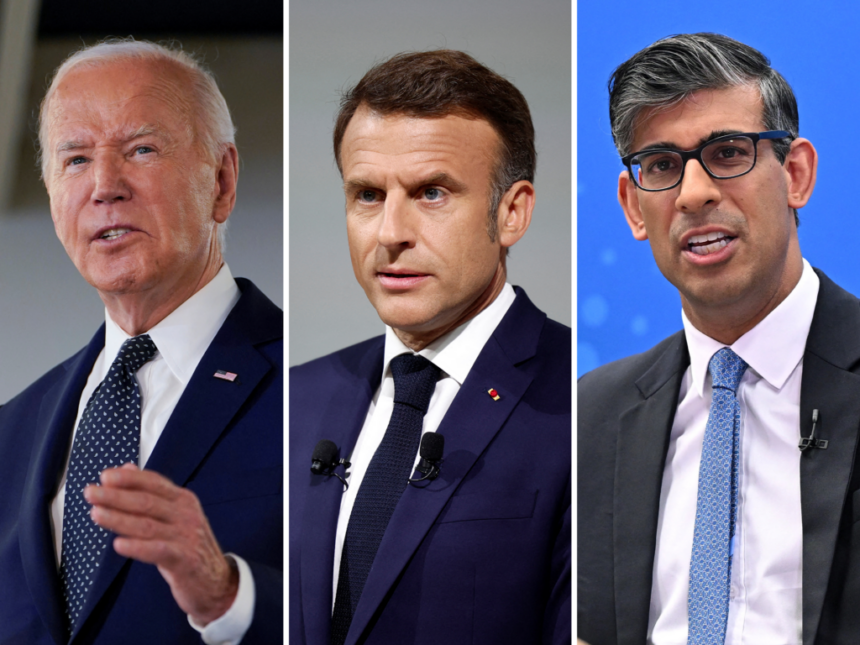Summary by Geopolist | Istanbul Center for Geopolitics:
The article from the Atlantic Council discusses how leaders Joe Biden, Emmanuel Macron, and Rishi Sunak are experiencing political and economic challenges due to their own decisions. Macron faces a hung parliament in France after snap elections, Sunak’s Conservative Party in the UK faces potential defeat due to economic stagnation, and Biden’s political future is uncertain amid questions about his age and capability. These self-inflicted issues could have long-term impacts on their countries’ political and economic landscapes.
For more details, read the full article here below.
This week, three of the Western world’s most significant leaders are suffering from self-inflicted wounds that are likely to have long-term political and economic consequences.
They are US President Joe Biden, French President Emmanuel Macron, and British Prime Minister Rishi Sunak, and this is no small story as their countries are all nuclear powers that represent the world’s first-, sixth-, and seventh-largest economies.
What I mean by self-inflicted is that Macron took a gamble on staging snap parliamentary elections, whose second and final round is on Sunday, in hopes of getting a fresh mandate after his party’s humiliating drubbing in European Parliament elections. He’ll pay a price with, at best, a hung parliament. At worst, he will enter into what the French call “cohabitation” with a far-right prime minister.
Sunak had until the end of the year to call elections in the United Kingdom, but picked today, July 4. He and his party look certain to be ousted, ending fourteen years of Conservative rule that has brought Brexit, historically low productivity gains, and growth levels below the European Union (EU) average.
Some Biden allies have been saying quietly since this time last year that he could best cement his legacy by stepping aside and letting a younger candidate take on former President Donald Trump. Instead, Biden has gambled on being able to arrest his own aging process—and then convince voters he has done so—a far more difficult prospect following last week’s debate.
It’s telling that these stories are coming together in a single week, with Western democracies all in anti-incumbent moods, often despite their own economic interests, which is especially the case in France.
Macron’s decision to hold these elections three years earlier than was necessary was based on the convoluted logic that voters would come to their senses and give him a fresh mandate rather than face the prospect of extreme-right rule.
Instead, the far-right National Rally is likely to produce the largest percentage of the vote in the second round of parliamentary voting on Sunday, closely followed by the newly united, left-wing New Popular Front, which includes everyone from center-left socialists to La France Insoumise, led by a former Trotskyite.
This week, more than two hundred candidates dropped out of the second round of French elections as Macron’s camp and the left are coordinating to stop National Rally from winning an absolute majority and thus the right to put in place a prime minister for three years of uncomfortable cohabitation with Macron, whose term doesn’t end until 2027. The most likely outcome on Sunday is a hung parliament, but one with a great deal of far-left and far-right leverage.
That puts at risk seven years of economic progress under Macron, during which France has cut business and wealth taxes, reformed employment and pensions to encourage hiring, and thus created two million new jobs and six million new businesses.
“The market could see both the extreme right and the extreme left promising to reverse cost-saving measures taken by the incumbent government (such as pension reform) without offsetting these with new sources of income,” write Sophia Busch and Charles Lichfield at the Atlantic Council.
This comes at a time when France’s finances are already fragile, with an annual budget deficit above 5 percent of gross domestic product (GDP) and public debt worth some 110 percent of GDP. In June, the European Commission named France as one of seven EU members states in violation of its new fiscal rules. The Paris Olympics starting later this month, with the sparkling new venues and train lines, might be less a celebration than a denouement.
The British Labour Party’s anticipated victory today, which could be so sweeping that it will break records, is less an endorsement of Keir Starmer’s expected leadership than it is a condemnation of fourteen years of Conservative rule. The Economist, hardly a fan of the British left’s proclivity for state intervention, endorsed Labour because “it has the greatest chance of tackling the biggest problem that Britain faces: a chronic and debilitating lack of economic growth.”
Starmer’s biggest success has been to quickly change course from predecessor Jeremy Corbyn’s leftist dogma to make the party electable. However, if he can’t address the country’s stagnant productivity, find new growth through investments and trade, and steer away from his party’s statist instincts, he won’t succeed.
The stakes are highest in the United States for November’s elections, as capital markets continue to shrug off the country’s dysfunctional domestic politics and growing geopolitical risks with yet another record high NASDAQ result this week.
Biden must decide within the next month whether to say in the race, and he’ll have to mull over the choice while his presidential duties carry on. Next week, the seventy-fifth NATO Summit kicks off. He will host heads of state and government from the Alliance’s thirty-one other members in Washington, DC, amid wars in Europe and the Middle East and tensions in Asia. The stakes have seldom been higher.
By: Frederick Kempe – president and chief executive officer of the Atlantic Council. You can follow him on Twitter: @FredKempe.
Source: atlanticcouncil.org







